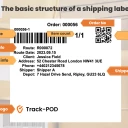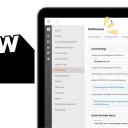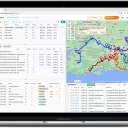10 Ideas for a Cargo Van Business
Updated on
March 25, 2024
by
Jennifer Collins
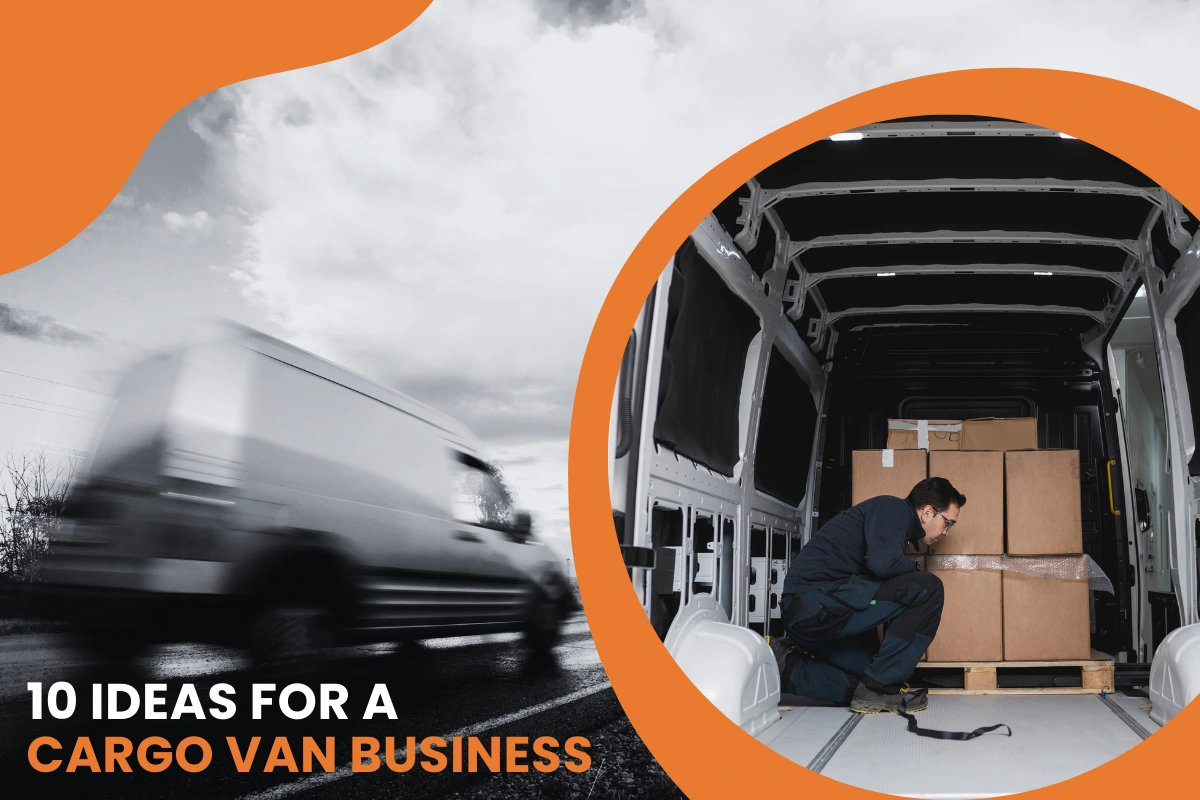
Cargo vans are ideal for small businesses as they can carry a substantial load but still have the same maneuverability in traffic as a large passenger vehicle. They don’t have back windows, but the cab and hold area are all-in-one, and most have a sliding door at the side and double doors that open outwards at the back of the van.
Cargo vans are easy to drive and to park at the side of the street when offloading packages. They have good visibility and a small front for extra clearance.
Jump to the part you are the most interested in:
- How to make money with a cargo van
- 10 profitable cargo van business ideas
- Getting started with your cargo van business
- Tips for running a successful cargo van business
- Best marketing strategies for your cargo van business
Their versatility allows you to add shelving, a divider between the front and back, and compartments within the back if you like. They have enough height for you to move around quite comfortably, although you may have to stoop a bit if you are tall.
There are companies that specialize in converting cargo vans and can give you some sound advice before you buy your van.
If you intend to go into business with a cargo van, it’s essential to do your homework up front:
- What type of business do you want to run?
- Is there a demand for your product or service?
- Who are your customers likely to be, and where are they?
- What size van are you going to require?
Investigate the various makes of vans, as the features do vary, as do the prices.
How to make money with a cargo van
The obvious use for a cargo van is to utilise it for deliveries, and in today’s busy e-commerce climate, small delivery loads should be easy to find and quite lucrative. And then there are more innovative ideas that can make money by virtue of the fact that not many people offer those services.
Whatever the service, be sure to factor fuel and mileage into your charges. You should be able to obtain a charge rate from your IRS department that includes wear and tear, fuel, and insurance per mile based on the type and capacity of your vehicle.
This charge is usually determined on an annual basis; however, some trucking companies add an additional fuel surcharge to their fee structure that absorbs any short-term fluctuations in fuel prices. Download a cost-per-mile calculator to estimate your expenses.
Cargo vans lend themselves to smaller loads, from flower deliveries to kitchen appliances. You can start an electrical or plumbing business and fit some shelves or boxes to hold your tools. You can include some passive income as well by posting other companies’ advertisements on the sides of your van or hiring it out when you are not using it.
10 profitable cargo van business ideas
Take note that you will probably need a commercial driver’s license, and there may be other regulations to consider when opting for some of the suggestions below.
1. Parcel deliveries
The easy choice is to use your cargo van as a delivery service. Many retailers prefer to outsource their deliveries to focus on their core business, which is selling.
Sign up with a retail company and provide the logistical support they need for their business. You can offer a unique same-day delivery service, urgent deliveries, or a standard courier option that may not fall on the same day but is cheaper.
Note that if you utilize ‘last mile’ strategies in your business, chances are you will be able to manage your deliveries on a same-day basis anyway.
Another way to find cargo is through load boards. These are online companies that match shipping and freight agents with delivery companies. These websites typically post available loads with a start and end destination, the type of cargo, and the weight.
If the route suits your location and the load is manageable, you can apply online for the load. You may find a return load, thus monetizing your return trip as well.
You can also advertise your services on one of these websites. Look out for ‘LTL’ (lower than truckload) loads, as they are likely to be ideally sized for your cargo van.

2. Small-load hauling services
People living in cities generally don’t have access to larger vehicles and rarely need them, but when the time comes to clean out old junk or garden refuse, they are stuck for options.
Advertise your services as a small load hauling service, but make sure you are strong enough to handle whatever comes your way. You may need to employ someone on a casual or full-time basis to help you with these loads.
Your service can include dumping garden refuse and rubble at the nearest dumping ground. Before starting your business, familiarise yourself with city dumping grounds and what they will take. Some dumps are for garden refuse only. If you have a mixture of items and need to travel between dumping sites, make sure you plan an efficient route and factor the extra travel into your charges.
It may be wise to invest in some heavy-duty garden refuse bags to make loading and unloading more accessible and less messy. It may be practical to drop off a bag or two with your customers so that they can fill up their bags before you arrive. Regular clients can buy bags from you to fill up at their convenience and call you when they are ready.
3. Fresh food and grocery deliveries
Collect fresh salad greens from small-scale farms or do a bread run from the local bakery, delivering the fresh goods to supermarkets and restaurants as the sun rises.
Depending on the products being transported, you may need to separate the cab from the hold and install some refrigeration or additional air conditioning.
Grocery deliveries have also become more popular since COVID-19, with many of the larger food chains offering their delivery services. However, smaller grocery stores are still outsourcing their delivery services, and you may be able to enter into a contract with a few of these stores.
4. Run a business
Be innovative and run your business from your cargo van.
Pet grooming, beauty salons, and hairdressers can operate a mobile business in their cargo vans. Converting your van will take some planning as you decide on installing a water supply, heating, basins, seating, shelving for equipment, and so on.
There are companies that specialize in van conversions, and their expertise may save you some money in the long run.
The advantage of running a van-based business is that you save money on expensive rentals for premises, and, as a mobile operation, you can service different areas on different days of the week, spreading your expertise and augmenting your share of the market.
Other businesses that would benefit from a mobile office are estate agents, catering businesses, auto repairs, clothing boutiques, and food trucks.
5. Passive income through advertising
Find yourself a client who would like to advertise on the sides of your cargo vehicle. Semi-permanent wrapping has become the smart way to promote, and it protects your car from chips and scratches and is less attractive to thieves.
There are restrictions against parking commercial vehicles outside your home in a residential area. If this applies to your location, an alternative solution would be to get magnetized signage that can be removed when the vehicle is not in use.
6. Rent your van out
Another way to monetize your cargo van is to hire it out. Ensure adequate insurance on your vehicle before starting, and factor a portion of your insurance costs into your hiring fees. You can settle on a daily fee for your van and charge an amount per mile. Some companies that hire vans out give the first 200 miles free but make up for it by increasing their hire fees.
Compare all the options out there and build up your fee structure accordingly. Don’t forget to factor in your marketing costs as well.
7. Recycling transportation
Do some research and start a small-scale recycling business. Offer to fetch recyclable materials from small businesses and transport them to recycling plants. Recycling companies generally pay per tonne, ranging from around $2.50 for a tonne of paper to $25 for cardboard, $150 for PET plastic, and $1,325 for aluminum.
Scrap metal can be very lucrative but not as easy to come by. Do your homework. Aluminium is a good option, but also bulky to transport. You can invest in a trailer with high expanded mesh sides.
Some companies provide their containers; otherwise, get some heavy-duty bags or plastic containers.
8. Gutter and window washing services
Your cargo van should be large enough for a fold-up ladder, brushes, a hose pipe, and scaffolding material. If you offer your services at office parks or high-rise buildings, you will need a rock-climbing certification plus all the necessary climbing gear, such as ropes, helmets, and harnesses.
As a professional window washer, you can charge up to $130 per hour, and your expenses after the initial outlay would be detergent. You will need an assistant if you are scaling the sides of tall buildings.

9. Event management and entertainment
Event management is a big business and involves the transportation of expensive equipment such as sound and photographic equipment, large speakers, scaffolding, props, draping, etc.
You can offer your transportation services to large event businesses or start your own event company, but make sure you have sufficient insurance to cover the equipment and include this in your costs. Approach event managers, sound engineers, and function decorators.
Alternatively, specialize in a particular niche in the event management industry. You can learn how to do the props and decorate yourself and build up a supply of props you can rent out for weddings and other celebrations.
Combine this with catering supplies that you can rent out, too. I would need assistance with this, as keeping track of stock may become a challenge.
10. Pet transportation
Specialized pet transportation is another niche business that is both lucrative and rewarding, particularly if you are an animal lover. People relocating, and breeders often need to transport pets to customers in different cities or states. Cross-border relocations come with different regulations, sometimes meaning pets are placed in quarantine. You may have to install air conditioning or heating in your van and have refrigeration facilities if animals are on special diets.
Aside from offering comfortable, specialized pet transfers, you could offer to take care of the legalities, such as transfer documentation and vet certificates.
Getting started with your cargo van business
Before starting out, determine your needs, as this will help you choose the right vehicle. Once you know what it is you want to do with your vehicle, find out whether there is a demand in your area, as it would not be viable to travel long distances every day. Do the research yourself or pay someone to do it for you.
Van dimensions
Once you have settled on a particular line of business, the next step is to decide what type of cargo van would best suit you. Check the size and weight capacity of the various vans, considering any special modifications that may be necessary for your business model. Check the capacity and height of the hold if space is a consideration.
There are two basic sizes of cargo vans: compact and heavy-duty. Here is a rough guide, but the sizes will vary depending on the vehicle's make.
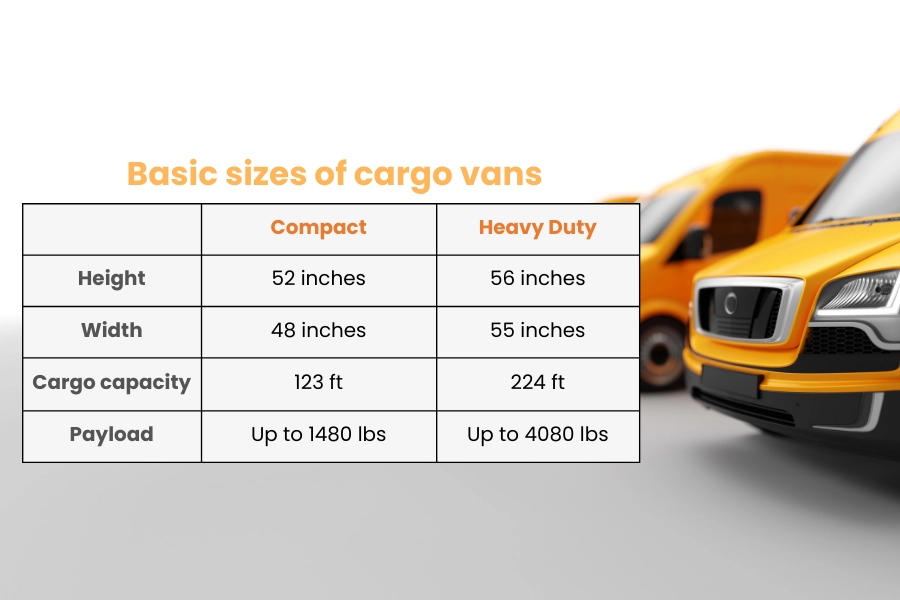
Consider the best loading option for your cargo and decide whether side or back door loading would be best. Many cargo vans have both options.
If budget is a concern, research whether you should buy a new or second-hand vehicle or whether leasing is a better option. A second-hand vehicle should come with a reliable service history. If you need to make any modifications of a permanent nature, then a van of your own would be best.
Research the different models on the market, considering fuel efficiency, reliability, safety features, and accessibility of spare parts.
Licensing and registration
Once you have decided on a business model, you must get your business licensed and obtain a tax number from the IRS. Check with your local licensing authorities, as not all countries and states have the same licensing requirements.
With that done, you can license the vehicle under your business name. Next, you will need a commercial driver’s license. Again, check with the vehicle licensing authorities. Depending on the size of your cargo van, you may not need a commercial driver’s license.
Make sure you have budgeted for all of this upfront, as the various costs can add up to a fairly substantial amount, and you can’t start trading until you are fully legal.
Insurance
Shop around for good insurance deals. Your vehicle must have comprehensive insurance, and if you are transporting goods, you will need insurance for that as well.
If you store tools or equipment in your cargo van, that should also be insured. If that applies to your country or state, you will need public liability and third-party accident insurance.
Your best bet would be to find an insurance broker who can explain all of this and tell you what you need. Don’t put off insurance because it’s costly—you can’t afford any mishaps at this point.
Marketing
Your van is the ideal medium for putting your business out there for all to see. What better way to advertise?
However, you will still need a marketing strategy. Know your client base, where you will find them, and how you will convince them that the service you offer is better than the competition.
There are many companies out there that offer online marketing advice. Do it yourself or get a professional in if you prefer.
Tips for running a successful cargo van business
Whatever your business model, financial savvy and operational efficiency are key to survival. You must watch your costs closely and figure out where to save money. When you can, put money away so that you can save money to buy another van or more equipment.
To save money, you need to maximize your operational efficiency. Make sure your vehicle is running at peak performance. Get the maintenance checks done on time, check the tires, and monitor your fuel consumption closely, as it can alert you to potential issues.
You need to plan your routes so there is no repetition or backtracking, avoiding big intersections and heavily congested areas if they waste a lot of time getting through. Time is money, and you could be putting it to use better. If you’re in the delivery business, schedule your delivery route to avoid wasting time and fuel.
Let your customers know when they can expect their deliveries. Customers are also busy people, and there’s nothing quite as frustrating as putting their whole day on hold because they have no idea when their parcel will arrive. If you can give them a rough ETA and stick to it, or communicate if there is a change, you will likely get their business again.
If you have appointments to meet, try to organize those too, so that you do not have to zig-zag all over town. Try scheduling the appointments in one area at a time to save on fuel costs and travel time.
It’s early days, and you may not yet have the resources for sophisticated software, but it may be worth looking at what technology can do for you at this point.
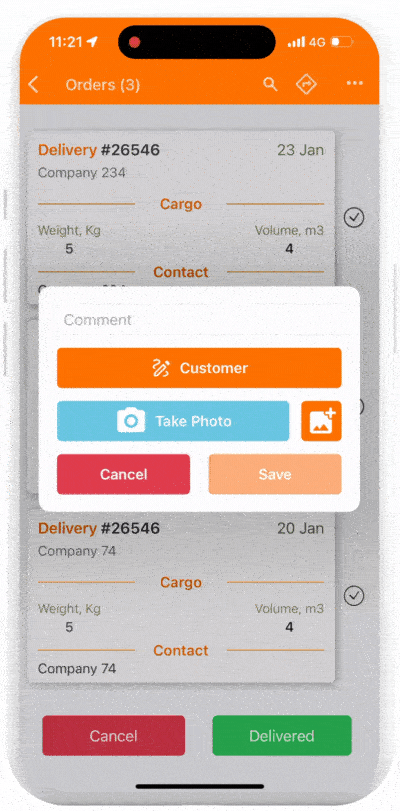
If you install a tracking system in your cargo van or utilize a delivery driver application on your smartphone, you can monitor your routes and fuel consumption more effectively. Whether you are behind the wheel or managing a team of drivers, these tools can pinpoint poor driving behaviors, including speeding, excessive idling, and unsanctioned phone usage during drives.
They also enable you to deter van misuse by sending alerts whenever the vehicle or the driver deviates from predetermined routes.
Scheduling your deliveries manually so they follow a logical route and don’t backtrack can take up much of your valuable time. Using route-scheduling software lets you plan your route at the touch of a button.
Track-POD’s route planning functionality enables you to upload multiple orders to its system and route them at a single click of a button, generating the most efficient route. This way, you can get more deliveries done in a day, saving time and fuel. Such route planning is a paperless process that helps avoid mistakes when managing all the order information.
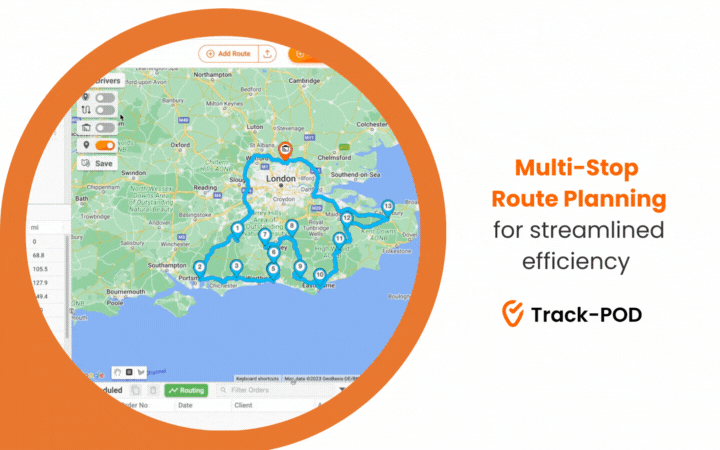
When planning cargo van operations for multiple drivers, it is worth remembering that such solutions like Track-POD come with mobile driver apps, enabling native sync between the dispatcher (you!) and the delivery drivers.
Best marketing strategies for your cargo van business
You will need a company name and logo that will stand out and attract attention. Try to include your type of business in your company name so that when people see your advertisements or your van driving by, they will immediately know what you do.
Having your own website is essential, and it may be best to have it done professionally. Optimize it for local business searches with SEO tools, or get your webmaster to do it.
Besides having a dedicated website, social media is one of the best places to market your business today. Many platforms accommodate business advertisements and have a huge following, such as Facebook and Instagram. Join the local community groups and special interest groups within your geographic area.
To start, keep your costs lower than the competition to get a foot in the door. You still need to be profitable, so do careful costing before advertising. Alternatively, offer special deals depending on repeat business or larger loads.
Here’s to your successful cargo van operation
Cargo vans are ideal small business vehicles. The compact size lends itself to innovative commercial operations, from parcel deliveries to beauty parlors, delicatessen delights, or tradesmen’s tools.
Your cargo van is the most important asset in your business. Keep it looking good and adhere to the recommended servicing requirements.
Maintain compliance with business, tax, and licensing regulations, work on a good marketing strategy that will ensure a competitive edge, and be creative. This will help you stay ahead.
The first few months of your new business venture are going to be a challenge, but persevere and keep an eye on your costs and operational efficiency. Consider optimizing your operations with the aid of technology and a touch of imagination, and keep your customers’ best interests in mind at all times.
Are you already in business? Consider Track-POD for all your route planning needs - register for a free 7-day trial today!

